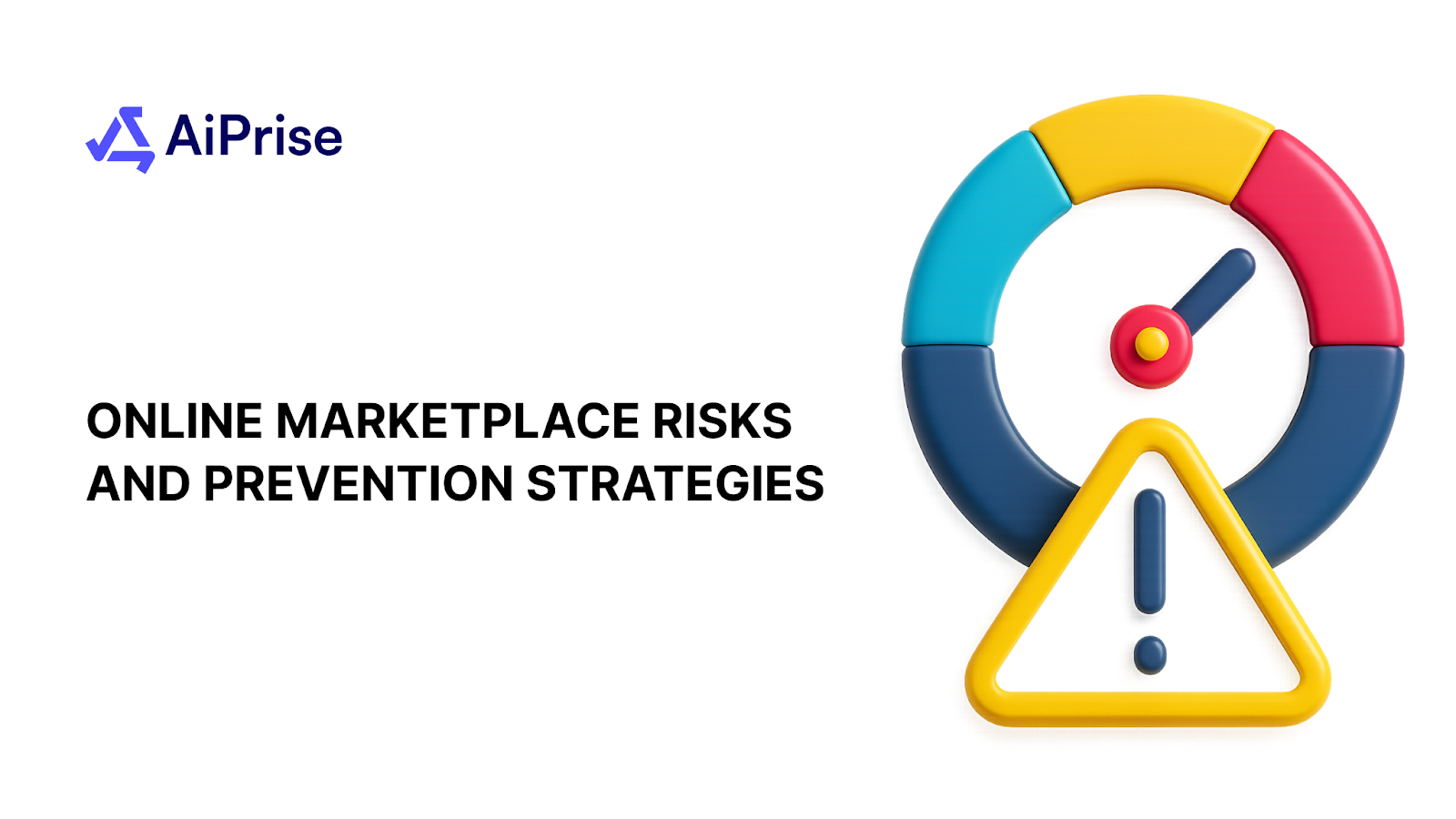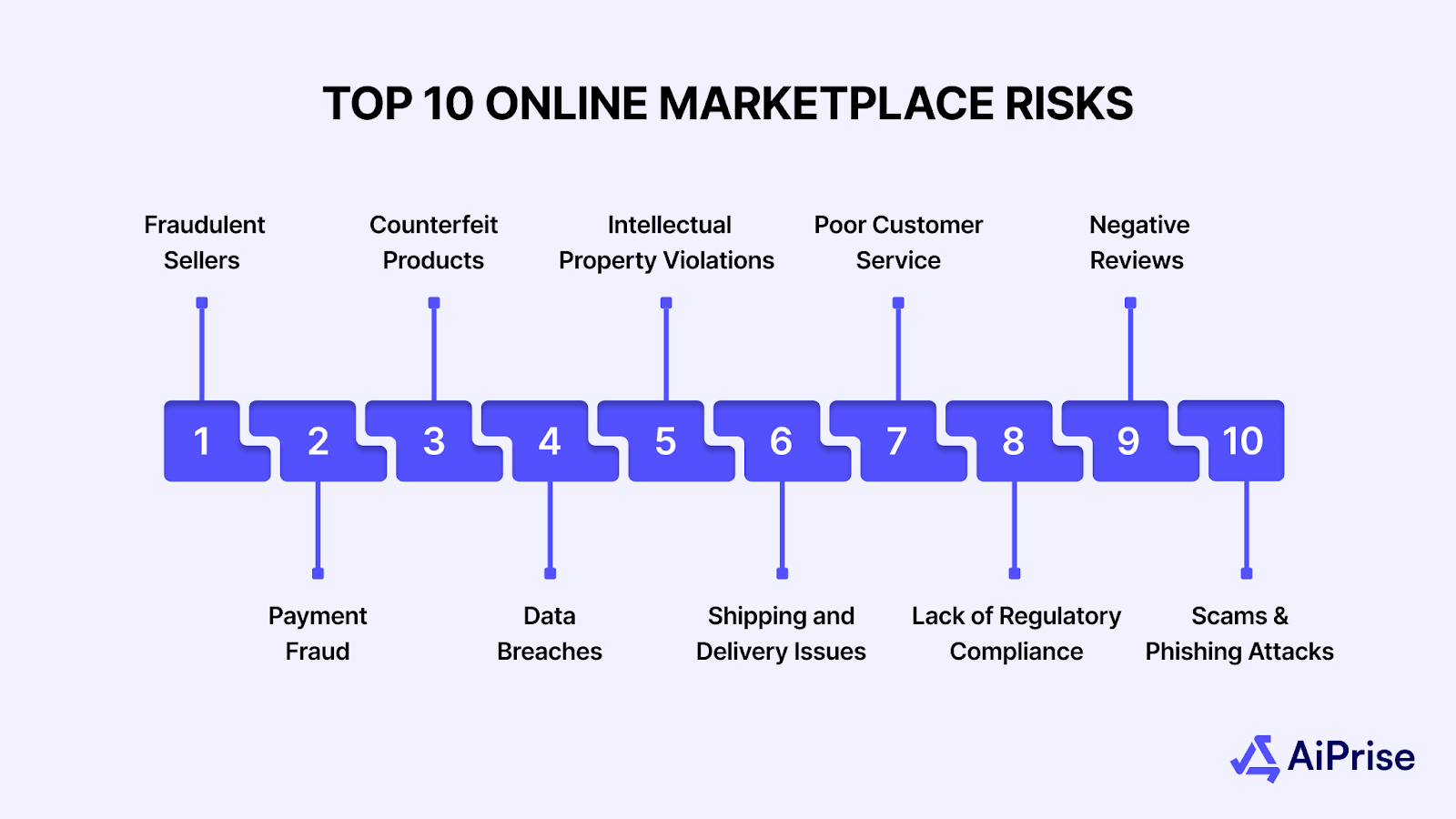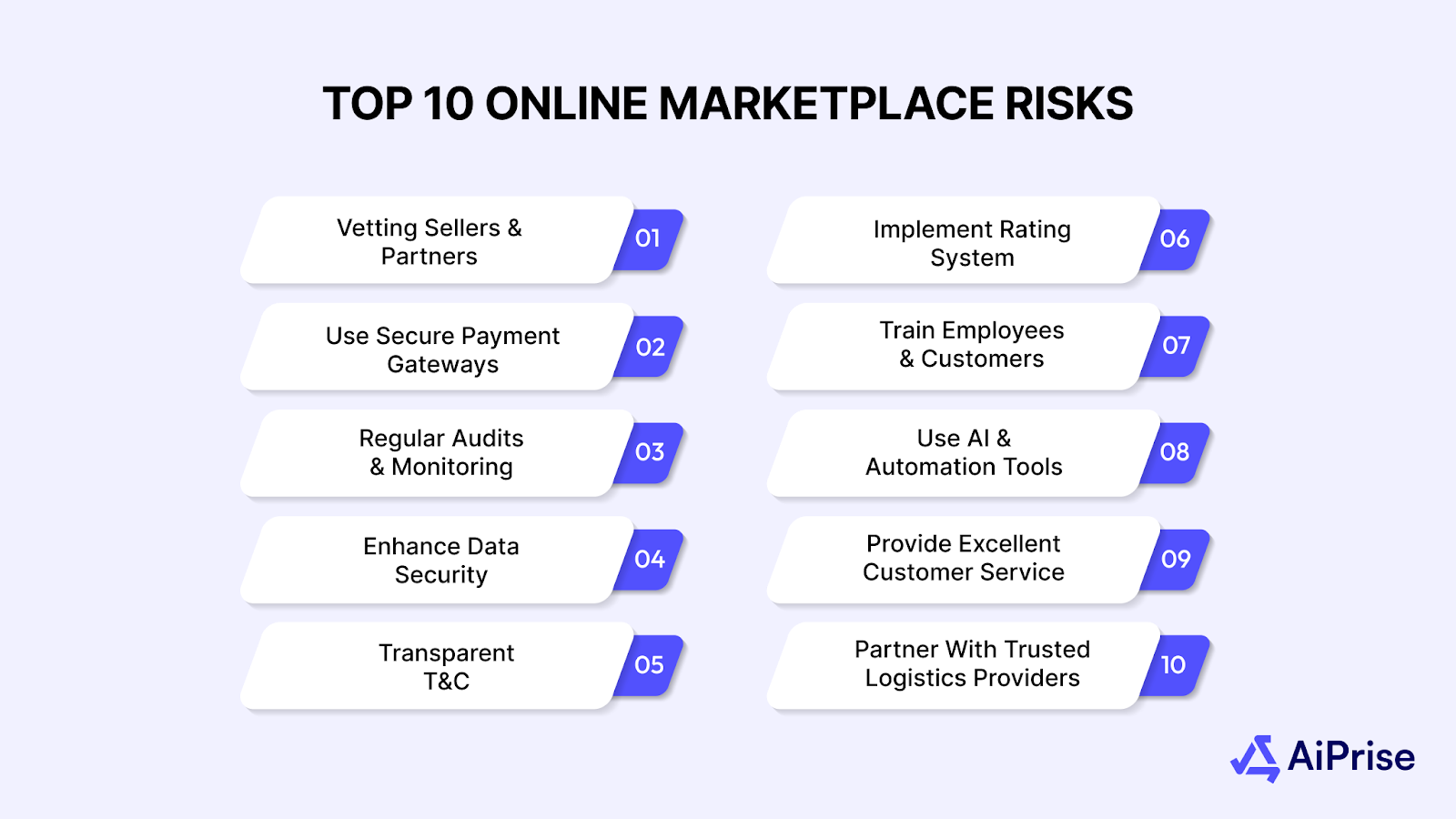AiPrise
9 min read
September 29, 2025
Online Marketplace Risks and Prevention Strategies

Key Takeaways










Have you ever had a frustrating experience buying something online, like receiving a late or damaged product, or one that wasn’t as described? Now, imagine facing similar risks when dealing with vendors or partners on online marketplaces. Would you know how to protect your company from fraud, counterfeit goods, or data breaches? With the rapid growth of e-commerce, online marketplace risks are becoming more prevalent, and understanding how to address these risks is essential for businesses operating in this space.
In this blog, we will explore the common risks faced by online marketplaces, how they can impact your business, and, most importantly, the strategies you can implement to mitigate these risks. By the end, you’ll have a clearer understanding of how to secure your marketplace operations.
Key Takeaways
- What are Online Marketplace Risks? These include fraud, counterfeit products, data breaches, and legal issues that can damage your business.
- Top Risks: Common risks are fraudulent sellers, payment fraud, counterfeit goods, security breaches, and shipping problems.
- How to Prevent Risks: Verify sellers, use secure payment systems, perform audits, and protect customer data with strong security measures.
- Why Compliance Matters? Compliance helps avoid fines, protect your reputation, and ensure trust with customers.
- Protecting Your Business: Use fraud detection tools, provide good customer service, and work with reliable partners to minimize risks.
What is Online Marketplace Risk?
Online marketplace risk refers to the various threats and vulnerabilities businesses face when conducting transactions or partnerships via digital platforms. These risks can range from fraud and security breaches to compliance issues and poor customer service. In the rapidly evolving digital world, these risks are not only challenging to spot but also have the potential to harm your business significantly.
These risks affect both buyers and sellers, as well as marketplace operators. For instance, sellers could lose their reputation if counterfeit products are sold under their name, while buyers may be subjected to fraudulent listings or poor-quality goods. The marketplace itself might suffer from declining trust, regulatory scrutiny, and even legal penalties.
Also Read: Defining Marketplace Risk And How To Prevent It
Top 10 Online Marketplace Risks

To effectively protect your business in the digital world, it’s crucial to understand the risks that come with operating on online marketplaces. These platforms offer tremendous opportunities, but they also expose your business to a range of threats. Here are the top 10 risks you need to be aware of when doing business on online marketplaces:
1. Fraudulent Sellers
Online marketplaces often face fraud from fake sellers who advertise non-existent products, deliver poor-quality goods, or don’t deliver at all. The impact of such fraud can be severe, including loss of revenue, legal troubles, and a damaged relationship with your customers.
The best way to counter this risk is to thoroughly verify sellers before entering into a business relationship. This can include checking seller reviews, verifying their contact details, and using fraud detection tools to flag suspicious behavior.
2. Payment Fraud
Payment fraud is a growing issue, especially in online marketplaces with high transaction volumes. Fraudulent buyers may use stolen payment methods or initiate chargebacks after receiving products, leading to financial losses and potential penalties.
To mitigate payment fraud, it’s important to use secure payment systems that include fraud detection capabilities. Methods such as two-factor authentication and payment verification can help minimize the risk of fraudulent transactions.
3. Counterfeit Products
Counterfeit products are a major risk in online marketplaces. Sellers may offer fake goods as genuine, harming your brand and causing legal issues. For industries like fashion, electronics, or pharmaceuticals, selling counterfeit items can lead to lawsuits, fines, and loss of customer trust.
Preventing the sale of counterfeit products demands a proactive approach. Regular monitoring of product listings, using AI-powered tools to detect counterfeit items, and collaborating with trusted brands for verification can help ensure that only legitimate products are sold on your platform.
4. Data Breaches and Privacy Concerns
As more sensitive customer data is shared online, data breaches are a significant risk for online marketplaces. If hackers gain access to your business or customer data, the consequences can be devastating, including identity theft, financial losses, and loss of consumer confidence in your platform.
Protecting sensitive data is important. Implementing encryption methods, ensuring secure data storage, and complying with privacy regulations are necessary steps to safeguard your marketplace from data breaches. Regular audits and updates to security systems can also help maintain a secure environment for customers and vendors alike.
5. Intellectual Property Violations
Selling counterfeit or unauthorized products can lead to intellectual property (IP) violations, including patent, trademark, or copyright infringements. This exposes your business to legal liabilities, financial losses from fines and product removals, and significant damage to your marketplace's reputation.
To prevent IP violations, it’s important to establish robust monitoring systems that detect counterfeit products. Implementing automated IP protection tools and working closely with intellectual property holders can help you safeguard your platform from these risks.
6. Shipping and Delivery Issues
Shipping issues like delays, lost items, or poor handling can lead to customer dissatisfaction and financial loss. Unreliable shipping methods harm your reputation, cause negative reviews, refund requests, and may even drive customers to shop elsewhere.
To minimize these risks, it’s essential to partner with reliable logistics providers that offer tracking systems, shipping insurance, and timely deliveries. Clear and transparent return and refund policies can also help manage expectations and resolve issues quickly.
7. Poor Customer Service
Customer service is an important component of any online marketplace. If your platform has slow response times, unhelpful support, or unresolved issues, it can quickly lose credibility. Poor customer service can result in bad reviews, complaints, and ultimately, a decline in sales and customer retention.
To ensure your marketplace remains trusted, it’s vital to provide responsive, helpful, and timely customer support. Self-service options like FAQs and chatbots can handle basic queries, while a trained customer service team can address more complex issues, ensuring customer satisfaction.
8. Lack of Regulatory Compliance
Operating in a global marketplace requires compliance with various laws, such as tax regulations, import/export laws, and consumer protection rules. Failing to comply can lead to fines, legal disputes, and even business suspension. Staying updated with changing regulations in different regions is crucial to avoid these risks.
To reduce this risk, work with legal experts who can keep your platform in compliance with all necessary regulations. Regularly updating your terms of service and policies to reflect the latest laws and ensuring all sellers are aware of these requirements will help keep your marketplace on track.
9. Negative Reviews and Reputation Damage
In online marketplaces, reviews matter. Negative feedback about products, services, or the marketplace itself can quickly damage your reputation, especially on social media and review sites. If left unchecked, bad reviews can lead to customer loss and hurt your profits.
Regularly monitor reviews, respond promptly to complaints, and take proactive steps to address negative feedback. Encourage happy customers to leave great reviews to counterbalance any potential negative ones. Building a positive reputation through customer satisfaction is key to long-term success.
10. Scams and Phishing Attacks
Scammers and phishing attacks can trick both buyers and sellers into sharing sensitive information, making fraudulent purchases, or even stealing login credentials. Such attacks are becoming increasingly common on online marketplaces, as cybercriminals take advantage of unsuspecting users.
To protect against scams, make sure your marketplace implements strong security measures, including two-factor authentication, secure logins, and encryption for sensitive data. Educate both customers and vendors about common scams and phishing techniques and encourage them to report suspicious activity.
By recognizing these common threats, businesses can take proactive steps to minimize damage before it escalates.
Now that we've covered the key risks in online marketplaces, let's explore some common strategies to effectively prevent these risks from affecting your operations.
AiPrise offers comprehensive fraud detection and KYB solutions that can help your business stay secure. Whether you’re verifying sellers or monitoring transactions, AiPrise’s advanced technology is designed to safeguard your operations.
How to Prevent Online Marketplace Risks?

Mitigating online marketplace risks requires a proactive and strategic approach. Below are some key strategies to help prevent and manage these risks:
1. Vetting Sellers and Partners
It’s important to perform thorough checks on all sellers and partners who join your platform. Ensure they meet specific criteria, including legal registration, positive reviews, and compliance with marketplace policies.
2. Use Secure Payment Gateways
Choose secure and reliable payment processors with fraud detection capabilities. Consider adding features like 3D Secure and tokenization to minimize payment fraud. Studies have shown that network tokenization can reduce fraud rates by up to 26% while improving transaction approval rates.
3. Regular Audits and Monitoring
Conduct regular audits and monitoring of transactions, sellers, and products to ensure compliance and identify any suspicious activities early.
4. Enhance Data Security
Invest in robust cybersecurity measures, including encryption, secure connections, and regular software updates, to protect sensitive information and prevent breaches.
5. Transparent Terms and Conditions
Make sure your terms of service, policies, and agreements are transparent and up-to-date. Clear guidelines on returns, refunds, and warranties can help avoid legal issues.
6. Implement a Rating System
A transparent and easy-to-navigate rating and review system can encourage sellers to maintain high standards and provide customers with honest feedback.
7. Train Employees and Customers
Regularly train employees on recognizing and handling fraud. Educate customers about phishing scams, fake sellers, and the importance of secure transactions.
8. Use AI and Automation Tools
Use AI-powered fraud detection and automated monitoring tools to identify and prevent fraudulent activities in real-time.
9. Provide Excellent Customer Service
Make sure that your customer service team is trained and available to handle issues quickly and effectively, which will help mitigate reputational risks.
10. Partner with Trusted Logistics Providers
Partner with reliable logistics companies that offer tracking services, shipping insurance, and efficient delivery processes to avoid shipping issues.
By understanding these strategies, you can minimize risks, protect your reputation, and ensure a smooth experience for your customers.
Also Read: How AI Powered Compliance is Revolutionizing Risk Management for Businesses
Build a Safer Marketplace with AiPrise’s Verification Solutions
AiPrise provides a complete set of tools to safeguard your platform from common marketplace risks such as fraudulent sellers, counterfeit products, and payment fraud.
Key features include:
- Government verifications
- Proof of address
- Watchlist screening
- AI-powered fraud detection
With these capabilities, AiPrise ensures your business remains secure and fully compliant.
Protect your marketplace with AiPrise today!
Final Thoughts
Understanding the risks of online marketplaces may seem daunting, but by taking the right preventive steps, you can protect your customers, business, and reputation. Staying proactive and implementing the strategies discussed above will help you safeguard your marketplace operations and foster trust among your users.
If you're looking to strengthen your fraud prevention strategy and reduce risks, AiPrise offers advanced fraud detection and KYB solutions to keep your business secure and compliant. Book A Demo with AiPrise today and take the first step in securing your business.
Frequently Asked questions (FAQs)
1. What are the main risks of online marketplaces?
The main risks include fraud, counterfeit products, data breaches, shipping issues, and regulatory non-compliance.
2. How can I protect my online marketplace from fraud?
Implement fraud detection tools, verify sellers, and use secure methods of payment to protect against fraudulent transactions.
3. Why is compliance important for online marketplaces?
Compliance ensures you meet legal standards, avoid fines, and maintain a trustworthy environment for users.
4. How can technology help prevent marketplace risks?
AI tools and automation can detect fraudulent activity, monitor transactions, and ensure secure payment processes.
5. What should I do if I encounter fraudulent activity on my marketplace?
Report the issue immediately, investigate the situation, and take necessary action, such as removing the fraudulent seller and notifying affected customers.
You might want to read these...

AiPrise’s data coverage and AI agents were the deciding factors for us. They’ve made our onboarding 80% faster. It is also a very intuitive platform.














